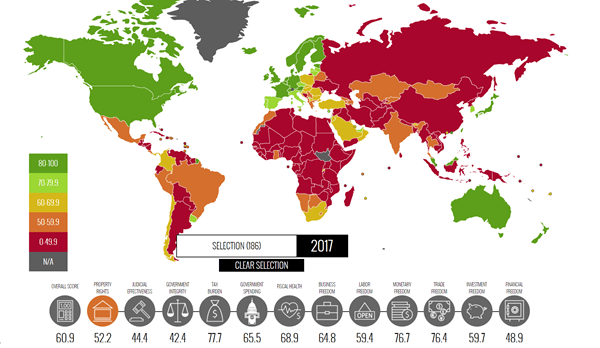Weak or nonexistent property rights lead to low economic productivity. Citizens of countries that do not protect property rights must necessarily spend much energy, thought and time in an anxious effort to secure what little production they can manage. Many innovations and business models are unfeasible without property rights because they will be destroyed (or, more often, deterred) by one or another form of theft. Even a marginal improvement in access to property rights should drive the economic equilibria of many countries in the direction of wealth creation.
Because it is decentralized, significantly easier to transport, store, or hide, and—this is crucial to augmenting property rights—significantly more difficult to seize than any tradition asset, Bitcoin delivers a real improvement in property rights at a comparatively modest cost (risk due to price volatility + transaction fees).
Beyond black market applications, Bitcoin has utility and value because most of the world’s population lives in countries that do not uphold property rights.
The average human on planet Earth lives in serious uncertainty about whether his property will be his tomorrow. (This interactive map is from Index of Economic Freedom published by Heritage Foundation, click here to play with it)
What Bitcoin Provides
- Provides a last resort store of value—and means of escaping with some assets—for people living in politically unstable or oppressive countries.
- Makes people more confident and more likely to be productive by providing a hedge against expropriation, hyper-inflation, theft, divorce (comical but true), and so on—meaning that people can work hard to accumulate wealth, with the confidence that they will be able to keep some portion of it, despite being the victim of some political turmoil or the target of some (in)justice.*
- Provides a means to streamline the pervasive and often necessary evasion of taxes, bureaucracy, and regulation in poorly governed countries.**
*It is important not to underestimate this. Uncertainty discourages people from working hard and taking risks. First world countries owe a significant part of their productivity and wealth to rule of law and property rights. Any shift in that direction should also increase the amount of economic activity in a country that is normally a dangerous place to be successful.
**Having done business in China and India, I speak from personal experience when I say that nearly every businessperson and any typical middle-class citizen in these countries are guilty of regularly, or at least occasionally, breaking tax laws, bribery, and so forth, to get by.
This is not just a third world phenomenon. At one point in my food cart manufacturing days, we worked with two Egyptian food cart partners in New York (they jointly ran several dozen food carts in Manhattan) who—in a bid to report as little income as possible to the IRS, a universal practice among small cash businesses in the city—stored tens of thousands of dollars inside a wall, only to find part of the money eaten by rats several months later (they, of course, only realized what had happened after hotly accusing each other of theft).
Giving People a Way Out
It is difficult for those of us living in peaceful Western democracies, and occasionally grumbling about taxes, to understand how front-and-center property rights issues can be.
Bitcoin provides a last resort for individuals and communities contending with hyper-inflation, capital controls, corrupt courts, extortion, and expropriation of all kinds.

Try selling your small business and leaving Zimbabwe.
Or take a stroll to the ATM to try and withdraw your hard-earned savings in an attempt to spend them before the currency loses 80 percent of its value.
It’s no surprise that by October of 2017 (note that articles above are both from 2016) Quartz reported that “Bitcoin is breaking all kinds of price records in cash-strapped Zimbabwe."
The Bitcoin network, despite its many imperfections, is proving itself as, at least, a moderate improvement in access to property rights and financial freedom for much of humanity.
Property rights issues cast a shadow that spans the entire income spectrum—whether you are a middle-class entrepreneur in Zimbabwe, who is not legally allowed to leave Zimbabwe with more than $1000 in cash as the political and economic situation descends into uncertainty, or the world-famous investor Prince Alwaleed.
Decentralized cryptocurrencies do have the potential to shift the equilibrium noticeably in favor of the individual.
Ironically, shortly before being detained indefinitely and very likely expropriated by the despotic Saudi “government,” Prince Alwaleed called Bitcoin an “Enron in the making.”
Although it’s very possible that Bitcoin’s price has run far ahead of its underlying value (and certainly many of the people bidding it up—including myself on occasion—are speculators, not users), the Prince’s bubble ended up bursting first.
While people like Prince Alwaleed obviously have access to more traditional methods of evading capital controls and expropriation (offshore banking valued at well over $15 trillion, shell companies, and so on), it is clear that Bitcoin—and perhaps the even-less traceable cryptocurrencies like Monero, Dash, and Zcash—is at minimum a useful new gadget in the offshore banking arsenal.
Bitcoin is even more useful for criminals (who in all likelihood made up the first critical mass of its users). But they are a rather small market compared to the enormous potential market of law-abiding and semi-law abiding citizens hedging against expropriation, unreasonably high taxes, unfair lawsuits in corrupt courts, capital controls, and so on.
Obviously, Bitcoin is not a silver bullet—the classic $5 wrench XKCD meme says it all:

Governments, fair or corrupt, still have plenty of very effective ways of detecting income, collecting taxes, expropriating property, and carrying on all manner of other financial/economic despotism. One cannot live on Bitcoin alone. The government can still take your house, your car, your land, and so on. However, decentralized cryptocurrencies do have the potential to shift the equilibrium noticeably in favor of the individual.
My own parents were forced to give up all of their possessions when they left the USSR. In fact, they had to pay a fee in order to leave. Had cryptocurrency existed in the 1980s, they would have surely sold their Moscow apartment and other assets for whatever they could get in Bitcoin. In the event, I think they managed to smuggle several thousand dollars worth of gold sewed into the lining of a fur coat.
[Side note: It was popular among people emigrating from the USSR to have gold dental work installed in a bid to carry out at least something of value… imagine what the USSR would have been like if this was possible.]
Communist countries are a perfect storm for cryptocurrency—subsidized electricity and zero property rights. Venezuela is the best example.
However, even China, which is hardly Communist, only allows private citizens to take $50,000/year out of the country. Unsurprisingly there is a general, and well-founded, anxiety among wealthy Chinese that the government will take away what they have earned. Chinese money has been a huge driver of Bitcoin’s price.
Even banning Bitcoin-RMB exchanges cannot stop the outflow completely.
Valuation
I can’t make any price predictions, but the next decade of the cryptocurrency industry’s growth should be interesting to watch.
When reckoning the long term (years, not months) market cap potential of Bitcoin and other competing cryptos, it is important to consider not just its black market use cases or its competition with gold (gold has ~$7T market cap) and offshore banking ($15–30T market cap), but also the new value it may create if it proves, in the long term, to be a better mousetrap for individuals in their struggles with corrupt and ineffective governments/social structures everywhere.
Not only does Bitcoin create value by providing a new, albeit imperfect, way to secure existing wealth, it will likely encourage the creation of new wealth by individuals living under otherwise discouraging political regimes. Even governments may trend toward better behavior as they find themselves forced to contend with Bitcoin. I can’t make any price predictions—there is still no certainty that cryptocurrencies will stand the test of time and scale—but the next decade of the cryptocurrency industry’s growth should be interesting to watch.
Disclosure: I have been holding BTC and some other cryptos on and off since some time after India withdrew large cash notes from circulation—which got me thinking along the lines above.
Reprinted from Medium.
Michael Dubrovsky
Michael Dubrovsky is a libertarian-leaning systems engineer interested in science, entrepreneurship, history, and economics. He was the co-founder of several startups—most notably MOVE Systems—and has experience establishing manufacturing operations both in China and the American Midwest. Michael is currently working on a cryptocurrency mining protocol project and planning to begin graduate studies in Materials Science. You can find more of his blog posts on Medium, where he applies meandering first principles analysis to a range of topics from woodworking to Net Neutrality.
This article was originally published on FEE.org. Read the original article.







